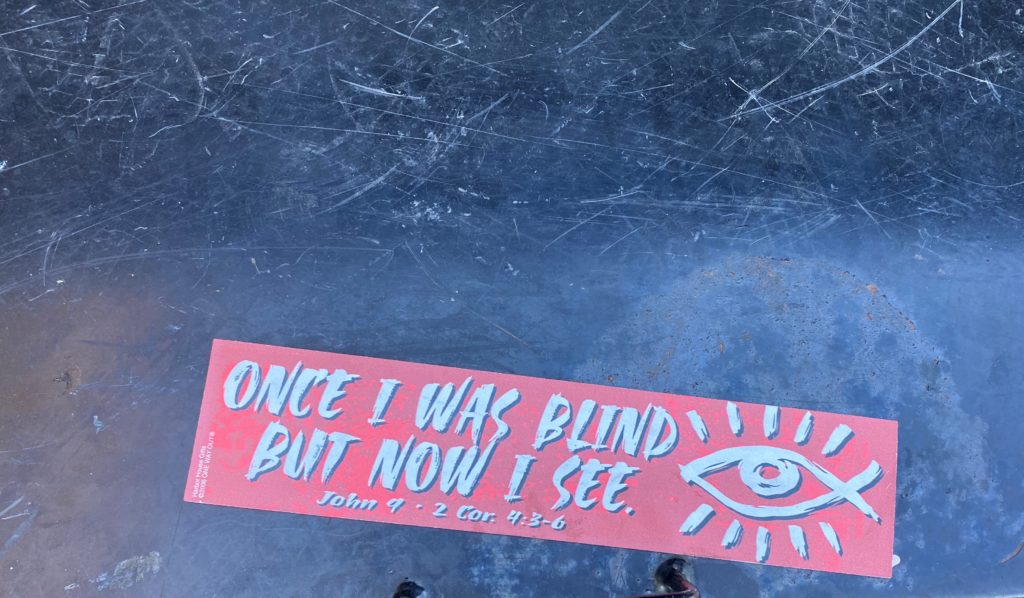Alan’s Story … and Our Story
Alan’s Story … and Our Story
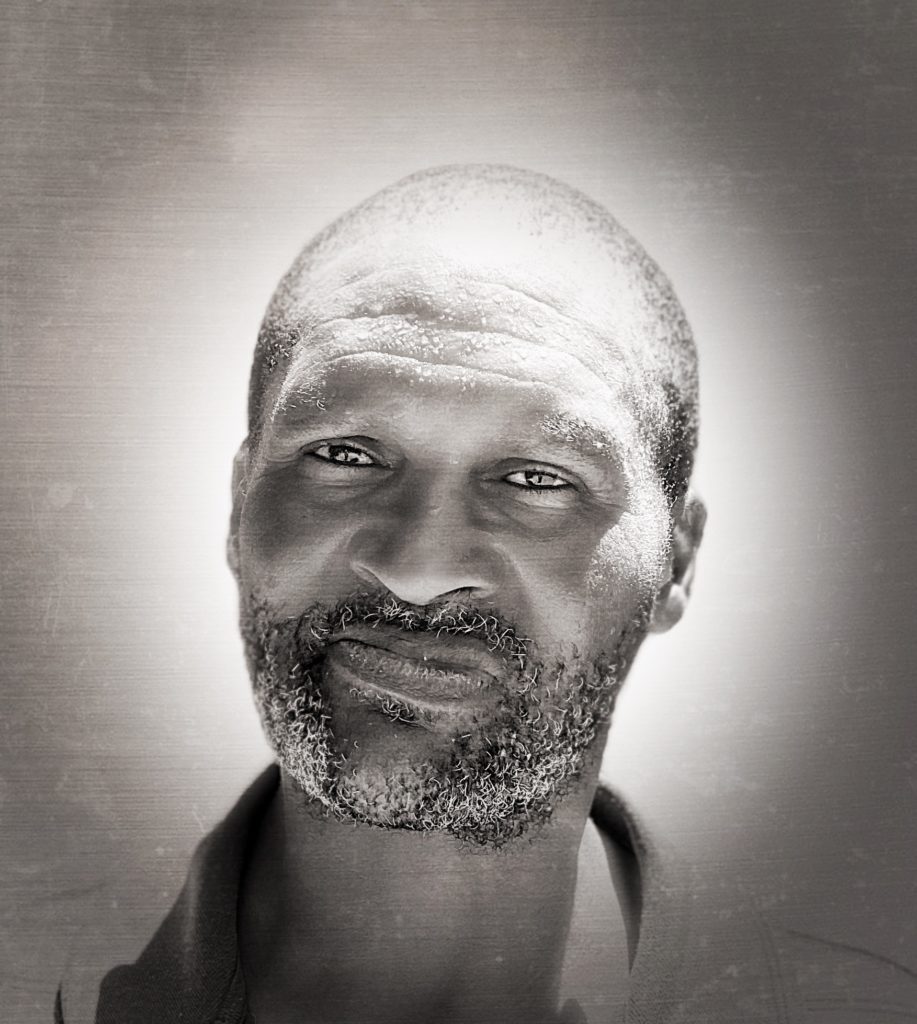
by Jenni Keast
Meet Alan. He just spent the last hour cleaning up a homeless encampment. He’s been living there since being released from prison. In 106-degree heat, it’s an exhausting and risky business—especially for a 60-something year-old man with a host of medical challenges.
No one asked him to clean up the place. He just did it. It’s who he is … thoughtful and caring. And dignified. He says “please” and “thank you” and then tells you his story. It’s been a hard life—with more than his share of raw deals.
But Alan doesn’t seem bitter. Just tired. And in a world of pain. While inside, he was housed in the prison’s medical facility. If you ask him what his life was like there, he grows silent. You don’t press. You just sit, listening quietly together to the afternoon breeze rustling through the trees. The wind stirs up more leaves, and Alan reaches for his broom. He doesn’t want his “home”—for however long he has it—to be messy.
As the unrelenting sun bears down on him, he wipes the sweat off his forehead, continuing to sweep away the leaves. He seems grateful for the conversation.

The Intersection
I recall the day that I too was homeless—or on the verge of it. Within a nine-month period, I had gone from feast to famine faster than you can say “caught in a pigsty.” I wondered if my car would be big enough to sleep in.
Although I was thirsty, I debated whether to even buy a bottle of water. As I reluctantly took my last five-dollar bill out of my pocket to pay for the water, the cashier at the coffee shop said, “Oh, you don’t owe anything … that man next to you just paid for it.”
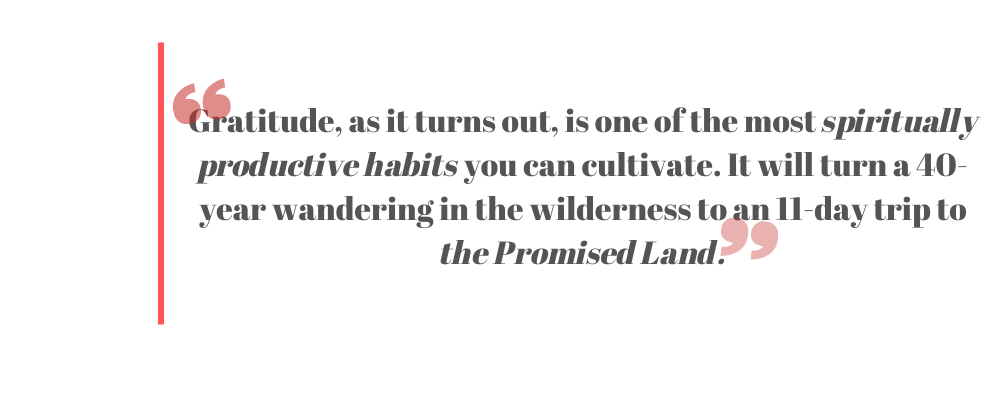
That man was a stranger. And, as it turned out, a catalyst for one of the most dramatic transformations of my life. I call it the Great Humbling. When I realized what this man had done, having no way of knowing I was down to nothing, I burst into tears. Of all the gifts ever given me, this is the gift I’ll remember the most.
It was then I heard God tell me, “This is significant … now say that aloud.”
I did then, and still do now. Gratitude, as it turns out, is one of the most spiritually productive habits you can cultivate. It will turn a 40-year wandering in the wilderness to an 11-day trip to the Promised Land. It did for me.
A Brother. And a Friend.
I don’t know what Alan believes about God. We haven’t gone that far in our conversations. I just know that his half-brother, Michael—also living on the street—watches out for him. Just as Alan looked after his younger brother when Michael was yanked one night from his grandmother’s home as a young boy.
Now, in Alan’s old age, his health declining, his brother returns the love … though what he can do for him isn’t much. They’re two trees leaning against one other, their root system precarious, just waiting for the next big gust to topple them over.
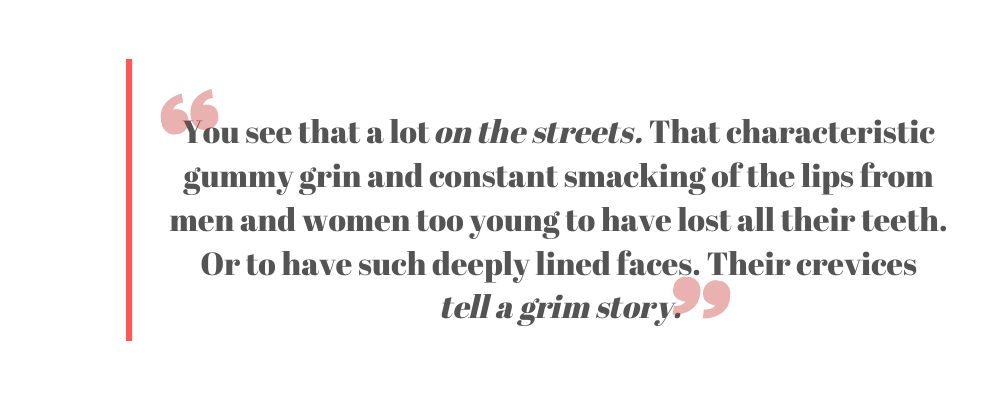
Alan also has a friend—a handsome and fit, but clearly directionless, young man named Roger who pulls a red wagon behind him everywhere he goes. Alan calls him “my bro.” You tell him they look just alike, which draws a wry smile from both men, since Alan is black and Roger white. “A brother from a different mother,” you might quip.
Alan tells you other things, but it’s hard to understand him as he only has a few teeth. You see that a lot on the streets. That characteristic gummy grin and constant smacking of the lips from men and women too young to have lost all their teeth. Or to have such deeply lined faces. Their crevices tell a grim story.
As you sit on a tree stump listening to both men talk, you find yourself hoping Roger doesn’t turn into one of those people. That he will find the job “working with his hands” that he says he wants. And the “little place of his own” that he dreams about. Then he can leave the little red wagon behind. And his troubled past.
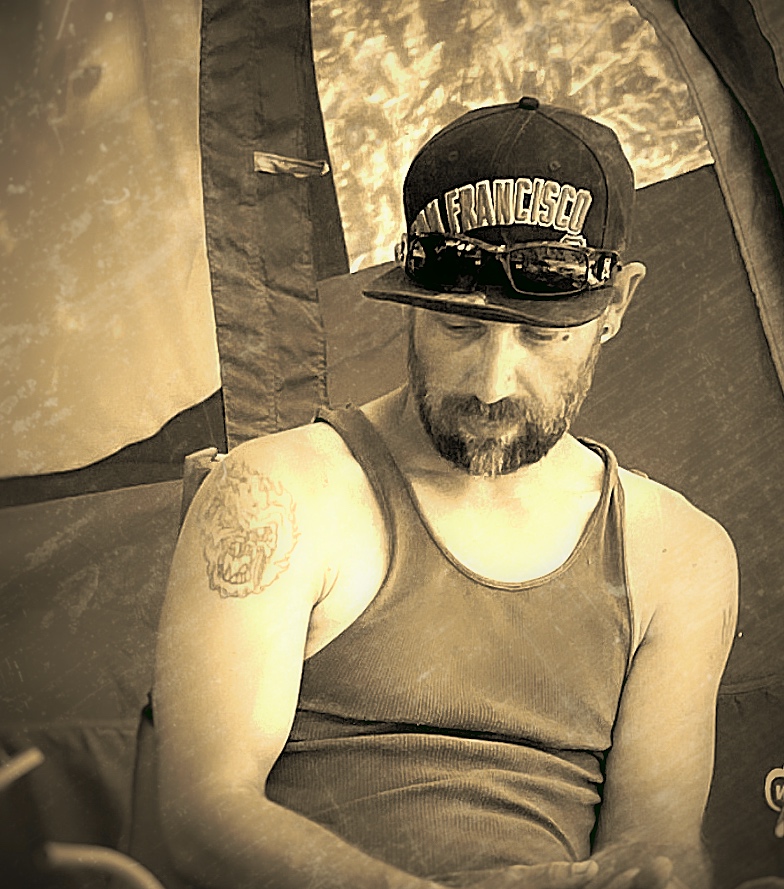
A man ought to …
For the moment, you must suspend your thoughts about Roger. He’s young, he’s fit, and right now he has more options than Alan. Roger will survive, and one day, through the grace of God and some practical help, wise guidance and prayer, he’ll thrive. You’re hopeful you’ll see him again. “There’s help there if you want it,” you tell him.
It’s just a “Yes, I want to change” away.
One thing I’ve learned through my own past wanderings away from the Father’s heart is this: I may have left Him, but He never left me. He was always waiting … standing at the edge of the driveway from the home I had left and scanning the horizon … eagerly looking for the first sign of my return. I know that the Father is looking for Roger even now.
Alan stands in front of me and I think of where he’s been and where he’s going. The elderly gentleman who’s seen too much, experienced too many disappointments and doesn’t hold out much hope that anything will change. The man whom no one wants to rent to because he has a record.
And yet he’s a man who shows pride of ownership of whatever space he’s in—even if it’s a hastily erected tent on a couple square feet of dirt. It’s in his character to do so. I wish others could see that about him.
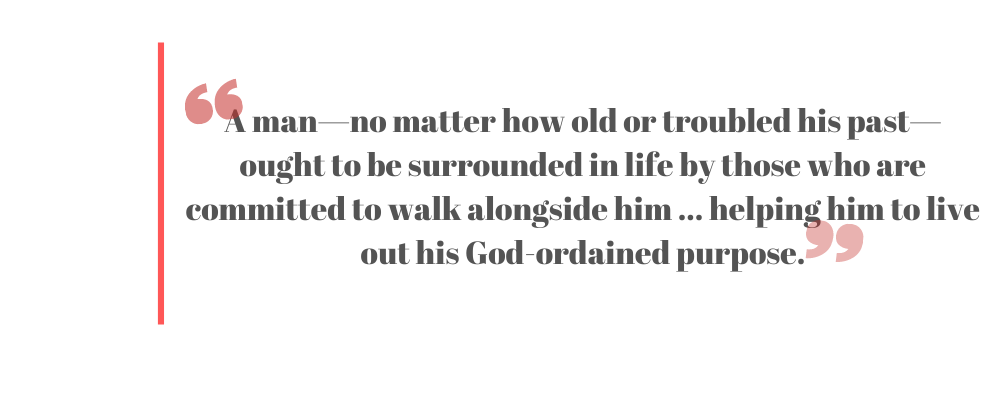
You’re not sure yet what you can do for him, but you know you have to do something. At the very least, you think to yourself, a man ought to be able sleep in a bed, not a camping chair. A man ought to have a roof over his head, and meaningful work … even if it’s simple work. To sweep a real floor … not a dirt one. And a man—no matter how old or troubled his past—ought to be surrounded in life by those who are committed to walk alongside him … helping him to live out his God-ordained purpose.
It’s what we do at the Mission, and we do it well. Not perfectly, but well. The graduates from our New Life Recovery program can tell you that. Because we believe that a man’s past should not determine his future. It’s not how you begin in life, but how you end.
CLICK HERE to help transform lives and strengthen community through the New Lives Recovery Program. It works!
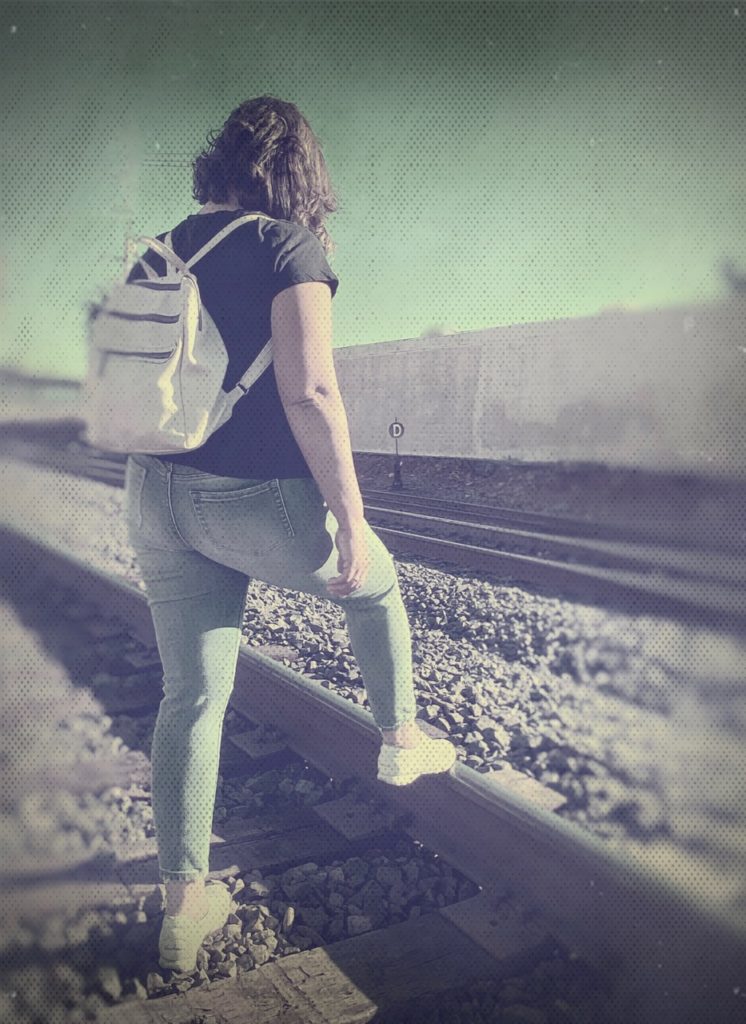
People Like Us
Alan’s story is just one of many who find themselves living on the street. You can read about who the homeless are in my post titled, People Like Us. Hint: You may be surprised at what you discover.
For now, I can tell you that they run the gambit of human characteristics, just like the people who live in homes, have a job, drive a nice car—you know, the ones who look and act quite respectable. If only it were that easy to tell the “losers” from the “winners.” It would certainly render the scripture, “Man judges the outside, God looks on the heart” obsolete, allowing us to live our comfortable, if unremarkable, lives. It would also make establishing our life goals, including sizing up others so that we can “win friends and influence people,” a pretty easy and straightforward process.
We all secretly want life to be an easy-to-follow formula. It’s what keeps religiosity alive and motivational speakers employed.
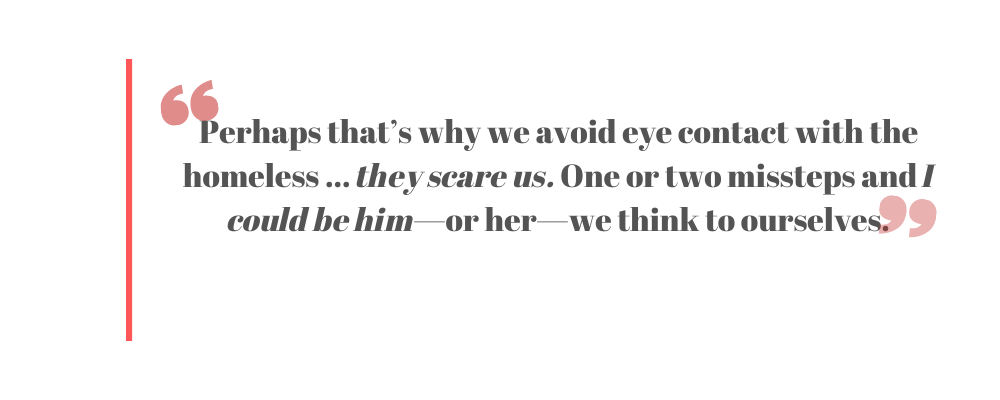
Fortunately, the Almighty, in His wisdom, keeps us guessing. He loves to throw us off “our game.” Because he knows how easily we can become prideful about our accomplishments—even noble and altruistic ones. And feel oh so superior to those who don’t look or act like us … or haven’t achieved what we’ve achieved. Perhaps that’s why we avoid eye contact with the homeless … they scare us. One or two missteps and I could be him—or her—we think to ourselves.
This is dangerous ground. As C.S. Lewis wrote, “Pride gets no pleasure out of having something, only out of having more of it than the next man. It is the comparison that makes you proud: the pleasure of being above the rest.”
In contrast, Jesus, who was a study in contrasts, said, “I have not come to call the ‘righteous,’ but to call those who fail to measure up and bring them to repentance.” The irony is that we all fail to measure up. The terrible tragedy is that that some of us know it, and others don’t. The latter folk give God little to work with.
I don’t know yet what category Alan falls into. From what I know of him, it seems to be the former. I do know that I see no perceptible chips on his shoulder—he seems genuinely humble. He’s also easy to talk to—quite likeable. His beginnings were clearly not good. His present painful. But I believe his future can be better.
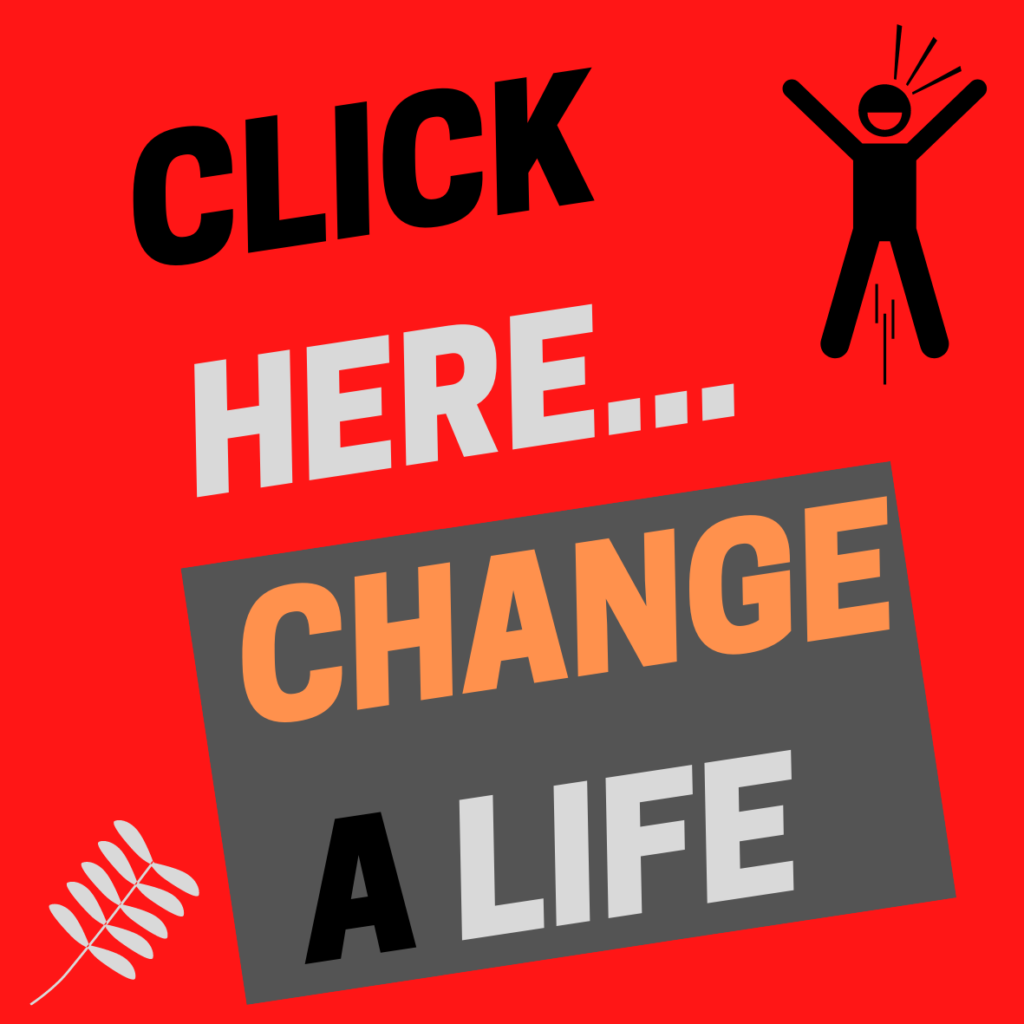 But for now, on this spot, on this staked-out plot of dirt that he will no doubt be evicted from within a week or so, Alan is a man struggling to sleep, to maintain his health … to find that peace that comes from being settled in one place. What he wants is to have what we all want—even if we’re self-avowed, free-spirited wayfarers who pretend otherwise. What we crave is a place to call home.
But for now, on this spot, on this staked-out plot of dirt that he will no doubt be evicted from within a week or so, Alan is a man struggling to sleep, to maintain his health … to find that peace that comes from being settled in one place. What he wants is to have what we all want—even if we’re self-avowed, free-spirited wayfarers who pretend otherwise. What we crave is a place to call home.
And yet, despite the absence of all the above, Alan is grateful for every little thing—and shows no malice towards anyone.
It’s a marked contrast to the rage-filled young girl camped out in the next spot over. It’s clear from the get-go that she’s a professional victim. It’s “f’ing” this and “f’ing” that about pretty much everything. Nothing is her fault and everyone else is to blame. She rages against me in a paranoid fog of chemically enhanced delusion—against anyone who will listen, really.
Entitlement on meth makes for a bad combo. It’s also a sad sign of the times.
And yet, I have to remind myself, she too needs help. A different kind of help, and at a time when she’s ready for it. She’s not there yet. When she is, we’ll be there.
Pruning is Painful
I’m hoping Alan will make his way to the Mission where he can find some rest … a place where he’ll feel accepted and loved and not judged by the outside world. A place where he’ll eat well, sleep soundly and make supportive and caring friends. A place where he can find renewed hope … where he can discover that “it’s never too late to become what you might have been.”
It’s a conversation I’m going to keep having with him. I’m not his savior and I can’t compel him do anything he doesn’t want to. Love doesn’t force … it woos. But I feel that he’s paid his proverbial debt to society and now deserves a different life. God hasn’t given up on him and neither should we. That’s why I have hope.
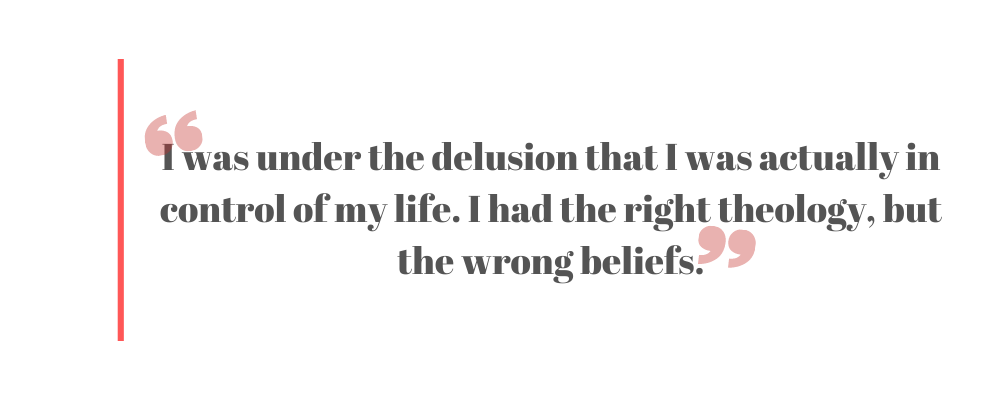
Not too long ago, someone—make that a lot of “someones”—had that hope for me. And when I humbly accepted it for what it was—a rare and precious gift—it changed my life. Though, to be honest, I didn’t go down without a fight. I was under the delusion that I was actually in control of my life. I had the right theology, but the wrong beliefs.
It can be quite frightening to come face to face with yourself, especially when you’ve spent most of your adult life running from that part of you. Right about then, that “fight, flight or freeze” response comes into play. I’ve done all three.
But in order to be the recipient of such a miraculous transformation, I had to come to the end of myself. To be willing to change when I was at my lowest, while still believing that there was a “highest” to aspire to—even at my age.
“God resists the proud, but gives grace to the humble.” No one knows that truth better than I do.
During that low point, it wasn’t easy holding on to the core belief that I was worth investing in—that neither my past mistakes nor my present circumstances defined who I was. All my props were kicked away and there I was—left alone on a stage playing to an unsympathetic, and at times, callous crowd who saw only what was happening on the outside.
They had no idea that underneath all that stripping away was a beautiful piece of masterfully crafted wood—strong, moldable and being beautifully formed to withstand the coming winds of adversity. And come they did.
I was—and am—how God sees me: beautiful, whole, generous, kind, compassionate, persevering, and worthy of love. All that pruning, though painful, was worth it—infinitely so.
Seeing Through Heaven’s Eyes
God sees Alan that same way. I never want to lose sight of that … quite literally. Every day I pray that he’ll give me gift to see others through his eyes rather than through my own limited vision. “This one thing I know, I was blind but now I see!” exclaimed the man as the religious leaders circled him—interrogating him about his miraculous healing.
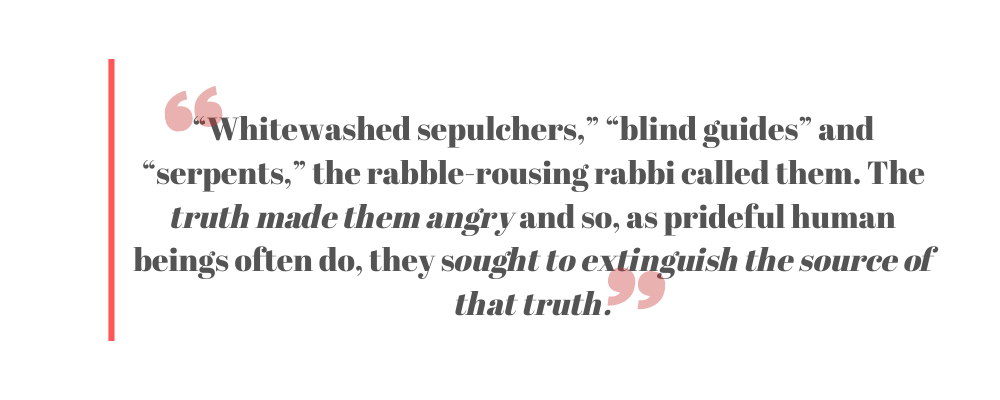
They cared less that a man who had been blind from birth could now see. Their agenda was only to use this man as a political pawn in their trumped-up case against an infuriating Galilean who had an unsettling way of looking into men’s hearts … and calling out what they truly were. In their case it was rarely good. “Whitewashed sepulchers,” “blind guides” and “serpents,” the rabble-rousing rabbi called them. The truth made them angry and so, as prideful human beings often do, they sought to extinguish the source of that truth.
For the Alans and Rogers of Jesus’ day—those who knew they were sick and in need of physician—it was a different story. Jesus became their friend, their confidant, their Redeemer. He offered them hope and life beyond the misery of their impoverished souls and present hardships. He offered them himself. And does so still.
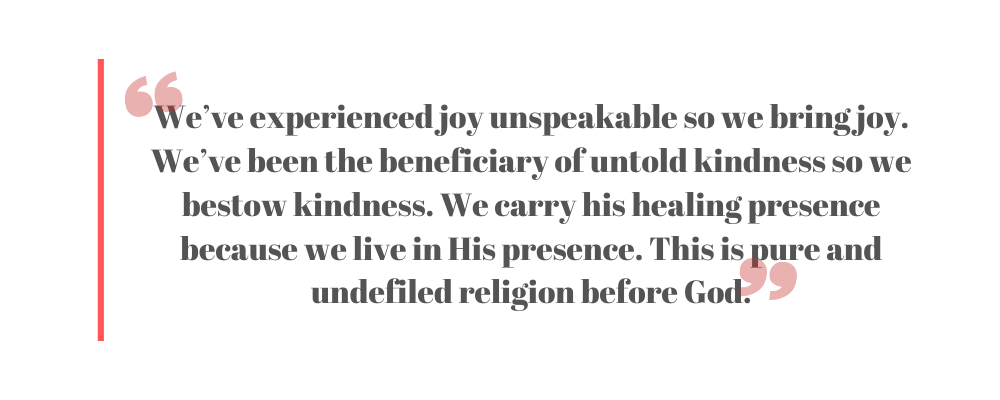
“I was blind but now I see.” That’s our theology. Our mandate. Our mission. We simply pour out what was poured into us knowing that whatever change we can effect in a broken world, we do so because we’re covenanted to become willing vessels—allowing our hearts to break over what breaks his. We’ve experienced joy unspeakable so we bring joy. We’ve been the beneficiary of untold kindness so we bestow kindness. We carry his healing presence because we live in His presence. This is pure and undefiled religion before God.
Let’s go and practice it.
